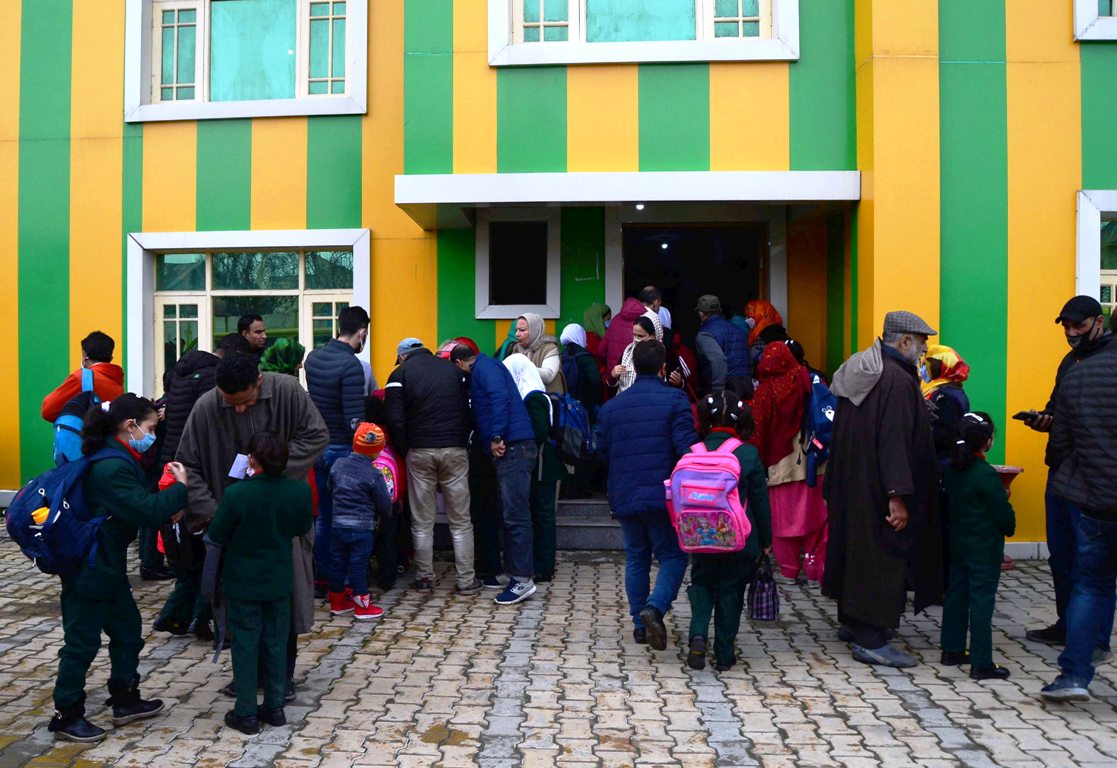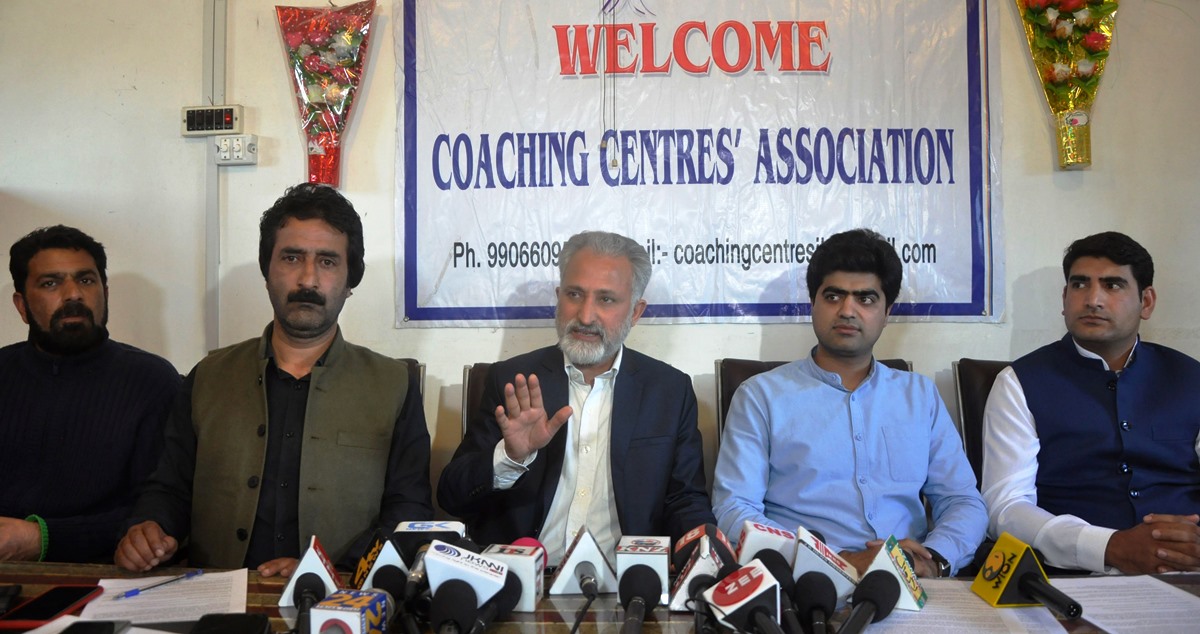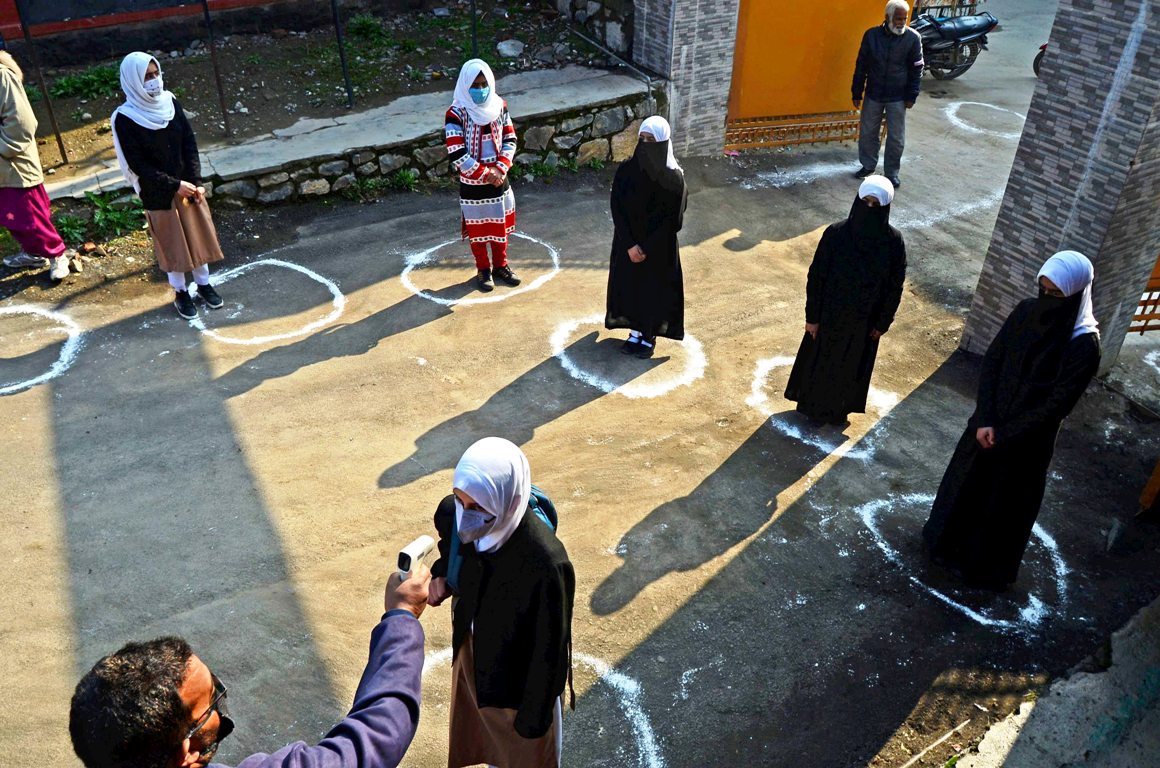Coinciding with encouraging visitor footfalls, the return of the seasonal workforce and the traders, the Government reopened schools after 19 months. An elaborate exercise involving almost every family, managing contagion-free campuses is a challenge on daily basis. A Team KL report about the issues and how the systems are tackling them in the public and private sector

On March 1, Arshad Ahmad, a government schoolteacher posted at a Pulwama school was passionate about resuming his duties and teaching the students. He had to enter the classroom exactly after 19 months of lock-down. Conscious of the loss that 19 months entailed for a student, Ahmad wanted to not waste any more time.
The last time he taught his students was August 3, 2019, two days before Article 370 was scrapped. This was followed by six months of security and information lock-down. Then in March 2020, the Coronavirus pandemic dictated another lockdown.
On the very first day of his school, however, Ahmad got a call from his principal’s office revealing that he had to attend a 5-day training programme. He had to immediately report to a new pace. Ahmad was bewildered.
“I found it bizarre. At least, management should know how much time is already lost,” said Ahmad. The training programme was about learning the SOPs to be followed to prevent the contagion to spread.
“I am not against the training; in fact, these are good exercises to participate in. But my only concern is – could we not do this prior to the opening of the schools also? Were not we sitting idle for a long time?” Ahmad said. “You pull out teachers from the schools on working days. It definitely affects the education of the children.”
Apart from this Ahmad said that the history of the teachers from different schools who participated in the training programme is unknown. Anyone could be infected and it can then multiply to a larger audience. The newer information about the invisible contagion is that this is more virulent as far as its distribution goes.
The Islamia College
Ahmad’s concerns proved right when the Islamia College of Science and Commerce, Srinagar reported an outbreak. Within a week after the opening of the higher education set-up, almost half a dozen teachers and officials of the college were tested positive for Covid-19. Initially, the college management tried to take it easy but finally, they had to shut the college for some time.

“A teacher in the chemistry department did a random check and he was positive. Then others from the department did tests and many of them were also positive”, said a senior teacher of the college, currently in self-isolation.
Contagion Carriers
Children, worldwide are being seen as the softest targets of contagion. Morbidity apart, children manage fighting the virus better but they become carriers of the contagion and ring it home.
Till date, Kashmir has reported 75341 positive cases, of whom 73418 people have fully recovered and 679 are still fighting the infection. Of 1974 deaths across Jammu and Kashmir, 1244 were from Kashmir. In fact, Srinagar accounted for 464 deaths and almost one-third of the overall infections.

In the last few days, the numbers have started surging again, albeit at a small scale. Srinagar continues to be offering most of the newer cases.
With seasonal migrants, travellers and the seasonal labour returning to Kashmir, the opening of schools added a new vulnerability. There are reports that most of the people entering Jammu and Kashmir through Lakahanpur are not being tested at all. “The entry seems more of a racket than a reality,” a senior lawyer said. “There are documents but no testing.”
No Vaccination
This is happening at a time when the vaccination has started on basis of priority. The government has gone ahead with immunization of frontline workers including the Anganwadi workers but teachers have been left out of even the second phase of immunization currently underway. The government also has no plan to include the teachers in the next phase leaving them along with students at risk of contracting the Covid-19.
The Jammu and Kashmir Immunization Officer Dr Qazi Haroon said currently teachers are excluded in the central government guidelines for the vaccination. Admitting that they have witnessed demand for immunization of teachers since the current vaccination drive started for senior citizens and for people above the age of 45 with co-morbidities.
“We have been under a lot of pressure in terms of the immunization of teachers and journalists,” Dr Haroon said. “We have started going to some schools and providing vaccination to teachers who are above the age of 45 with co-morbidities.”
The doctor added that going to every school and vaccinating every co-morbid teacher is a difficult job which is why they have advised teachers above the age of 45 to visit the nearest vaccination centre and get vaccinated.

“I attend three classes a day and I come across around 150 students daily. Ok students at this age have good immunity but teachers are mostly aged,” one senior college teacher said. “Doctors have been prioritized who see one to one patients but when we go into the class, we at a time attend a bulk of students and have to interact with them.”
Most of the colleges are overcrowded. In certain colleges that lack adequate infrastructure, the situation is quite grim.
Various teachers in colleges and schools alleged their campus administration has not taken the pandemic seriously. Most of the college lack sanitizers, thermal scanning, and in certain cases, even water points with soaps do not exist.
The Peripheral Scene
Compared to Srinagar, the situation in schools in Kashmir periphery is completely opposite as there are almost no cases reported anywhere. Most of the schools of north Kashmir are following the protocols to avoid the spread of the virus.
“As per protocol, thermal screening is being done. Odd-even has been implemented and different masks for different days have been provided to students,” said Rameez Ahmed, a teacher of a north Kashmir school.

He said in order to manage the crowd and maintain social distancing they have divided the total number of students into two groups who are being taught in different classrooms.
Another government teacher Naseem Ahmad from south Kashmir said that he has been apprehensive about going to school because he fears contracting the Covid-19.
“We also have families. I have children. What if we contract the virus? The government’s infrastructure is very poor particularly in schools below the middle level,” Ahmad said.
A senior executive at the DPS Srinagar said they have evolved an SOP and they religiously follow it. “It is a disease and we are completely transparent. We had one case and we ensured that every single contact is traced and tackled,” the executive said. “Fumigation and the SOPs are normal with us and there is no compromise.”
Happy Students
Unlike teachers, the children are enthusiastic about the reopening of the schools after one year.
“It’s better than online classes as it’s easier to understand what the teacher is saying,” Mohammad Shahid, an 11th standard Humanities student at Green Valley Educational Institution Srinagar, said. “Online classes became tedious after a while and it was no fun learning things online.”

They, however, see a lot of changes in the campuses. They have to follow many dos and do not’s and they has certain areas as no-go-spaces within the schools. “We do not have to attend morning assemblies now and going to the canteen is not allowed so, we are supposed to remain in classrooms all the time,” Shahid added.
Tuition Centres
Unlike the government schools, where management forced schools to shut, the scene at private coaching centres is different. Not a single coaching centre has recorded any positive cases so far even though they were running throughout the winter.
The coaching sector credits it to their strict adherence of the Covid 19 protocol.
Muntazir who runs a coaching centre at Pulwama said, “We have good space in our institutions where we ensure social distancing. We do not allow any students without masks and have kept sanitisers at every place.”
Sanitization
Prior to some days of the reopening of the institutions, authorities did sanitize all-educational institutions. Even the director of the school education said that before reopening of the schools there will be sanitization and cleaning of schools five days earlier.
“We have issued the guidelines to the school heads to ensure proper cleaning and sanitation of classrooms,” the Director School Education has said.

But teachers don’t set take this part very seriously. “This was done when there was no footfall,” one teacher said. “Now when teachers and students go to schools, they do not sanitize any classrooms. There was a need to sanitize the classrooms now almost every two-three days.”
Three weeks have passed since the opening of colleges. In how many schools and colleges they have done random sampling? Nowhere.
The authorities in central Kashmir’s Budgam district on March 6, ordered the closure of the three schools for at least three days after some teachers and students were tested positive for Covid-19.
A letter issued by the nodal officer Covid-19 mitigation cell Budgam Aadil Bashir has asked the heads of these three educational institutions to close down the school premises’ immediately for a period of not less than three days after detection of Covid-19 positives cases in these schools.
The letter states that all the primary and secondary contacts of the affected teachers and students are advised to self-isolate themselves. “Testing for all the contacts will be undertaken in due course of time,” the further reads.
The schools which have been closed include Government middle school Hanjiguru Budgam, IEI School Budgam and Mazaharul Haq High school Budgam. He said that in the government Middle School Hanjiguru and IEI School a few teachers have tested positive while in Mazaharul Haq high school a teacher and a student have tested positive.
The Monitoring
A master trainer said they have trained the heads of the institutions and now every other follow up is on-line. They have already distributed an elaborate SOP document within the schools, both private and the public sector schools.
“We have more than 500 people across Kashmir who monitor the schools on daily basis and the discrepancies are conveyed online in real-time,” one of the senior teachers who is part of the monitoring set-up said. The schools being inspected on daily basis by these monitoring teams include the private educational set-ups.

Subsequently, a daily report is also being drafted to check and inform everyone about each zone and school visited on a particular day.
The parameters checked and included in the report of the monitoring teams include whether frequent cleanliness and disinfection of school Infrastructure/equipment is being followed along with proper waste management. The report also includes the use of masks by teachers and students, maintaining hand hygiene along with a physical distance of two meters at all places in the school (Inside the classroom, in the ground, in corridor’s, at stairs, entry and exit points, during mid-day meals).
The report also mentions handwashing stations, separate toilet facilities, soaps and sanitisers and if the school have formulated Covid-19 task teams comprising of teachers and volunteer students. This is, in addition, to checking staggered time table, odd-even mode, flexible time table of student attendance in case of high enrolment schools. The teams also check whether sharing of student’s belongings, meals etc are discouraged in schools or not.
In one of the daily reports accessed by Kashmir Life, a team in the Srigufwara area of Anantnag under Rifat Saroosh visited Nice National Institute of Creative Education where a mass function was going on without maintaining social distance. Subsequently, the team sensitized the school authorities about the course correction.
In another case, the inspection team visited Government Middle School Kreeri where 42 students were enrolled and the team pointed out that the schools wasn’t following various SOPs. The team in their comments/remarks pointed out that the problem was because the school was operating out of rented accommodation.

While in the daily reports the comments are mainly satisfactory vis-à-vis the SOPs followed by schools, the teams have also found many schools failing on many fronts.
Colour Coded Masks
The schools have been asked to arrange washable coloured masks for the students – at least three. One education department official said they have been asked to use some school fund to source these masks. But all the schools do not have this fund.
Hussain, a teacher in a primary school in Kupwara and four of his other colleagues have pooled money to bring the masks for children of his school. They have a roll of around 50 students. Each of them has contributed Rs 1000. They had an order for doing so, a verbal order from their concerned zonal education officer.

Hussain said that they were told to bring the masks of three different colours for children: blue, green and white. According to Hussain the verbal order asks to make children wear each colour mask for two days. “We are doing so without any written order and we spent money from our own pockets,” Hussain said.
Private Sector Response
G N Var, president of the Private Schools Association, has his own take.
“I am against the idea of reopening the schools. This is a knee jerk reaction,” he said. Var said that the government is doing all this under influence of the public perception and does not see the logic. “They do it at the cost of people’s lives. What if a mutant strain of virus gets into the school, our future generation would be at risk.”
Var said that the government must do some research about its own schools. “There are some schools which are overcrowded, some do not have proper infrastructure and some lack the amenities,” he said. “We have to appreciate that 80 per cent of the students’ study in such schools.”
With a huge population of students enrolled with private schools, Var said they were not taken on board. “Had they taken us on board, there could have been a better and effective coordination in handling such crises.”
(Piloted by Umar Mukhtar, contributions to this report were made by Yawar Hussain, Saifullah Bashir and Syed Samreen.)















